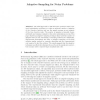Free Online Productivity Tools
i2Speak
i2Symbol
i2OCR
iTex2Img
iWeb2Print
iWeb2Shot
i2Type
iPdf2Split
iPdf2Merge
i2Bopomofo
i2Arabic
i2Style
i2Image
i2PDF
iLatex2Rtf
Sci2ools
92
Voted
GECCO
2004
Springer
2004
Springer
Adaptive Sampling for Noisy Problems
Abstract. The usual approach to deal with noise present in many realworld optimization problems is to take an arbitrary number of samples of the objective function and use the sample average as an estimate of the true objective value. The number of samples is typically chosen arbitrarily and remains constant for the entire optimization process. This paper studies an adaptive sampling technique that varies the number of samples based on the uncertainty of deciding between two individuals. Experiments demonstrate the effect of adaptive sampling on the final solution quality reached by a genetic algorithm and the computational cost required to find the solution. The results suggest that the adaptive technique can effectively eliminate the need to set the sample size a priori, but in many cases it requires high computational costs.
Related Content
| Added | 01 Jul 2010 |
| Updated | 01 Jul 2010 |
| Type | Conference |
| Year | 2004 |
| Where | GECCO |
| Authors | Erick Cantú-Paz |
Comments (0)

